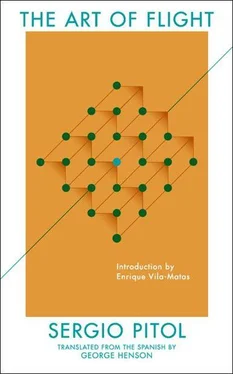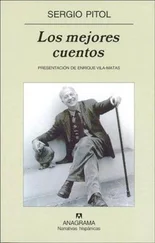Sergio Pitol - The Art of Flight
Здесь есть возможность читать онлайн «Sergio Pitol - The Art of Flight» весь текст электронной книги совершенно бесплатно (целиком полную версию без сокращений). В некоторых случаях можно слушать аудио, скачать через торрент в формате fb2 и присутствует краткое содержание. Год выпуска: 2015, Издательство: Deep Vellum, Жанр: Современная проза, на английском языке. Описание произведения, (предисловие) а так же отзывы посетителей доступны на портале библиотеки ЛибКат.
- Название:The Art of Flight
- Автор:
- Издательство:Deep Vellum
- Жанр:
- Год:2015
- ISBN:нет данных
- Рейтинг книги:5 / 5. Голосов: 1
-
Избранное:Добавить в избранное
- Отзывы:
-
Ваша оценка:
- 100
- 1
- 2
- 3
- 4
- 5
The Art of Flight: краткое содержание, описание и аннотация
Предлагаем к чтению аннотацию, описание, краткое содержание или предисловие (зависит от того, что написал сам автор книги «The Art of Flight»). Если вы не нашли необходимую информацию о книге — напишите в комментариях, мы постараемся отыскать её.
The first work in Pitol's "Trilogy of Memory," The Art of Flight imaginatively blends the genres of fiction and memoir in a Borgesian swirl of contemplation and mystery, expanding our understanding and appreciation of what literature can be and what it can do.
The Art of Flight — читать онлайн бесплатно полную книгу (весь текст) целиком
Ниже представлен текст книги, разбитый по страницам. Система сохранения места последней прочитанной страницы, позволяет с удобством читать онлайн бесплатно книгу «The Art of Flight», без необходимости каждый раз заново искать на чём Вы остановились. Поставьте закладку, и сможете в любой момент перейти на страницу, на которой закончили чтение.
Интервал:
Закладка:
The old man recovered his wits; he asked mockingly, as if he had not heard the writer’s words, if he had decided to participate in the boar hunt, if he had oiled his old rifle and counted his cartridges, but, just like his wife, he did not wait for the answer and between groans added that they would leave from Bratislava the following Friday at four thirty in the morning, and that the hunt would last two days. The writer attempted to add that he only went on pheasant hunts, more than anything else because of the accompanying accoutrements: campfires in the snow, hunting music, horns, dinner at the castle. The old man frightened him again as he stared at him with the brutal coldness of his prosthetic eye and the maniacal fury of the other, and just when he expected to be labeled decadent, or “artistic,” he was surprised to hear the old man say, his voice stifled, almost unintelligible, that he too had once been to that inferno, that he recalled with horror that abominable island, although the verb recalled was perhaps not appropriate, because he never recalled that desolate place, unless someone was foolhardy enough to mention it to him, which, as it were, rarely happened. He was very young then, naive, uncorrupted, you might say, he did not know how to defend himself, much less possess the physical capabilities to do so, when a pack of hungry she-wolves, of she-wolves that were hyenas and vultures, attacked him, beat him with belts and straps, threw him to the ground, bit him, and took advantage of him and his purity. That dark confidence ended with a groan, and then, without saying goodbye, he turned, leapt toward a group of guests most certainly to remind them that the wild boar hunt was to take place next week in Slovakia. He then turned suddenly with military precision, retraced his steps, and faced him once again, as if the conversation had never ended.
“Don’t think,” he said with an expression marked by sullenness, “that I did not notice my wife’s unusual garrulousness at the table tonight. She did not allow anyone to speak, is that not right? One can never understand women; they spend the whole day immersed in the dreariest silence, and then, when least expected, they turn into magpies. What had her so excited?”
The writer commented that it had been a very instructive conversation; that in an environment as rigid as diplomacy, where women were accustomed to talking about trivialities, it was refreshing to meet a woman who could discuss such interesting topics.
“Topics? What topics?” he asked, as if carrying out a police interrogation. “Answer immediately! To what topics are you referring?”
“Your wife reveled in imagining what Conrad said to European women, the English in particular, in the Malaysian ports. She speculated on how Conrad might describe the dress of those long-suffering colonial women.”
“What are you saying, what, about whom was she talking?” It was evident that the response had flummoxed him.
“About the great Joseph Conrad, your wife’s favorite novelist.”
The old man made a violent gesture with his hand, which could be interpreted as “go to hell!” and he withdrew, hopping like a giant cricket.
Once home, the writer recalled the woman’s monologue about her elegant youth in Madeira and her husband’s subsequent comments. It seemed as if he had heard two versions of the same highly dramatic situation without having understood much about it, not even what about it was dramatic. And that was precisely the kind of exciting element necessary to create, to begin to invent, a plot. The enigmas were many: a dynamite explosion that takes place on a boat, the absurd explanation of wanting to blow up a reef to improve the view of a house where no one was interested in aesthetics, the couple’s relationship, the buckle, the belts, the woman’s coldness during this part of the story and, at the same time, the almost crazed excitement with which she described the chiffons and silks and brocades. A few days later, he remarked to some colleagues how strange the encounter with the couple made him feel. He learned that the Finnish doctor had said once that the ambassador’s wife had been a dressmaker in her youth, a woman who could reproduce a dress from a mere photograph. He tries to invent a story; the porcelain eye torments him; he begins to imagine scenes and even begins to give them dialogue; the ambition of the dressmaker, spurred by a greedy mother, to trap the suffering boy, heir to a large fortune. He imagines the girl and her mother as third-class guests at some get-togethers, admiring the dresses from the great ateliers of Paris, as well as those they had cut and sewn with their own hands. Whenever they discovered one of theirs they would exchange looks of complicity and joy.
A writer often listens without hearing a word spoken; other voices trap him. The voice of a real person disappears or becomes mere background music. Sometimes a few words send him to one imaginary character or another. Other times — and that’s what’s so surprising! — the writer doesn’t even know that the voices he tries to incorporate into a character, or a plot, are not intended for that story, that lurking under the plot exists another one, waiting for him.
The day arrives when he sits down to work. He has failed to resolve the enigma of the dynamite; he looks for the relationship of the explosive with the craters in the garden of the house in Funchal. Surprisingly, out of the blue, a new character has emerged, a young theosophist who joins the dressmaker and her mother in their daily outings to visit the patient. Sometimes, only the two young women make the visit. Others, the theosophist goes to the injured young man behind her friend’s back. The discovery of the young theosophist girl is tantamount to discovering a gold mine. He sees her, hears her, and knows what she’s thinking. Her body is very small, her head larger than it should be, but she is far from a monster; at least not physically. There is something about her, however, something frightening: her rigidness, the harshness of her look, her sullen appearance. A fluid contempt for the world seems to exude from each of her pores. The author sees two young women of markedly dissimilar appearance walking down the road that leads to the mansion where the injured man lies: one is blonde and tall, a bit ungainly, well dressed; the other, the theosophist, is wearing a blouse and skirt of an almost military cut. At that moment, she recommends ferociously to the dressmaker something new and wicked to do to the patient. Anyone who saw them would think they were an ostrich and wild boar crossing, without noticing — so lost were they in thought — a flower garden’s beauty.
When the novelist finally begins his story, Funchal and its surroundings, all of Madeira and its characters, disappear completely. Only his new discovery, the theosophist, survives. There she is: sitting in a restaurant in the lobby of the Hotel Zevallos; yes, facing the main square in Córdoba, Veracruz, where she moves much more naturally than on the flowering avenues of Funchal, which is not to say that she has become pleasant or polished or relaxed, nothing of the sort. The world is revealed to the writer at that moment. He has begun to translate himself. “Writing is a case of impersonation, forging an identity: writing is passing yourself off as someone else.” At that moment, he is now that someone else. By transplanting the location, the young woman maintains her physical characteristics and is still a theosophist. She has returned to her hometown after living with her mother and sister in Los Angeles, California for twenty years, where the three had feverously read Annie Besant, Krishnamurti, and, above all, Madame Blavatsky. Upon her mother’s death, she travels to Córdoba, which she left when she was six or seven, to claim an inheritance. She stays at the home of family friends, perhaps distant relatives. Everyone knows her as “Chiquitita,” a nickname from her childhood and one that fills her with a heavy rage that she dares not show. Her resources are negligible, which is why she doesn’t leave the family who has welcomed her; every day she notes in a diary her petty expenses. She has forbidden herself any kind of luxury. A lawyer friend of her mother advises her to contact one of the opposing parties, her tío Antonio, for example, who is the most amenable. The same lawyer is responsible for arranging the interview. Chiquitita follows his instructions and meets her uncle for lunch one day in the lobby of the Zevallos. He addresses her nonchalantly, as if everything between them were perfect. “What a gorgeous niece I have!” he says as he greets her, adding: “You look much better in person, caramba , I mean, what a beauty!” But the young woman at no time lowers her guard; she frowns sullenly throughout the meal. She’s the same prickly person she ever was. Watching him drink glass after glass of beer during the meal repulses her. She reprimands him somewhat severely, commenting on the incompatibility of drunkenness and legal affairs. Her uncle laughs, amused, and calls her cutie pie, kitten, and pipsqueak. At the end, over dessert, her relative agrees to talk about the matter they met to discuss. He insists that he doesn’t see the need to go to court, the case should be settled amicably, as should all things among family; that she must, however, understand that the property in dispute does not belong to her, that before leaving Córdoba her mother was compensated appropriately, that while she was alive she received a monthly payment. Just then, he’s about to add that in spite of everything the family has considered giving them a sum, the amount of which would be determined when they signed a waiver renouncing their claim, but doesn’t manage to say it because Chiquitita beats him to the punch. She berates him with a string of disconcerting adjectives and a tone so sarcastic and petulant that the brute becomes enraged and responds with a remark so vulgar that it frightens her. He can be heard shouting, so every local will know, that if anyone in Córdoba remembers her mother, it’s because of her whoring-around, that he personally would see to it that she and her sister don’t see a penny, that he would prove that they were both daughters of someone other than his brother, her mother’s husband in name only, and that therefore they had no right to any part of the inheritance. He then adds sarcastically that the best thing she can do is find a husband, or an equivalent, to scratch her belly and support her. Suddenly, the beast of a man gets up and leaves the restaurant. Stunned, Chiquitita remains at the table, not so much because of the violent way she’s been treated, or because of the references to her mother’s loose behavior, nor because she discovers that recovering the portion of the assets that belongs to her is going to be more — much more! — difficult than she imagined, not even because of the scandal involved, but because of the mere inability to pay the tab. Overcome by rage, and on the verge of tears, she asks the waiter if he’ll accept the watch that hangs around her neck for a half hour, the time needed to go where she’s staying and pick up the money to cover the bill.
Читать дальшеИнтервал:
Закладка:
Похожие книги на «The Art of Flight»
Представляем Вашему вниманию похожие книги на «The Art of Flight» списком для выбора. Мы отобрали схожую по названию и смыслу литературу в надежде предоставить читателям больше вариантов отыскать новые, интересные, ещё непрочитанные произведения.
Обсуждение, отзывы о книге «The Art of Flight» и просто собственные мнения читателей. Оставьте ваши комментарии, напишите, что Вы думаете о произведении, его смысле или главных героях. Укажите что конкретно понравилось, а что нет, и почему Вы так считаете.












